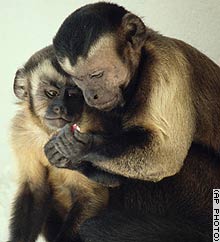From: CNN.com, September 17, 2003 (AP)
Fair is fair, even to monkeys

An adult, right, and a juvenile capuchin monkey are seen demonstrating food
sharing behavior in this undated handout photo.
|
Humans aren't the only ones who hate a bum deal, it turns out.
In a recent study, brown capuchin monkeys trained to exchange a granite token for a cucumber treat often refused the swap if they saw another monkey get a better payoff -- a grape.
Instead, they often threw the token, refused to eat the piece of cucumber, or even gave it to the other capuchin after viewing the lopsided deal, said Emory University researcher Sarah Brosnan.
She said the results indicate man and monkey may have inherited a sense of fairness from an evolutionary ancestor.
"This implies we evolved this way," said Brosnan, whose work with colleague Frans B.M. de Waal is reported in Thursday's issue of the journal Nature.
The trait may have helped species cooperate and survive, Brosnan said.
However, Charles Janson, who studies capuchins at the State University of New York at Stony Brook and was not involved in the research, suggested the monkeys' behavior may have been learned in captivity, rather than inherited as an evolutionary adaptation.
Brosnan said she doubted the behavior was learned, saying most animals "cannot learn things which they do not naturally do in the wild."
"More importantly, however, learning behavior requires that individuals get rewarded for performing a specific behavior," Brosnan said. "In our test, the subject actually received less reward for refusing to exchange."
The researchers, at Emory's Yerkes National Primate Research Center, studied five female monkeys, testing them two at a time.
When both monkeys were given a cucumber slice after handing over the token, they completed the trade 95 percent of the time.
But when one was given the tastier grape for the same amount of work, the rate of cooperation from the other monkey fell to 60 percent, with the cheated primate sometimes throwing the token, refusing the cucumber or giving the cucumber to the other monkey. And when one didn't have to do anything to get a grape, the other made the trade for the cucumber only 20 percent of the time.
The refusal to make the exchange increased as the experiment went on, the researchers reported.
"They were not happy with me," Brosnan said, although she later added that she couldn't really know what the monkeys' emotions were.
The scientists concluded that capuchins apparently measure rewards in relative terms, comparing their rewards to those available, as well as their efforts to those of others.
Small and highly animated with faces that resemble wizened old men, the tropical forest-dwelling capuchins were chosen for the experiment because they often share food.
Brosnan, who said she is now conducting similar studies with chimpanzees, noted that the capuchin that got the grape didn't react at all to the unjustness of the situation. That "probably implies there is still a lot of difference between their sense of fairness and ours," she said.